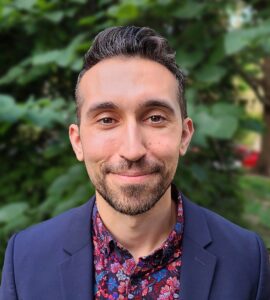 Associate Professor Daniel Aaron, who teaches tort and health law, joined the S.J. Quinney College of Law in fall 2023. His interests center on the intersection between law and medicine, which stem from his educational background. Aaron had initially planned to become a doctor and earned his MD from the Boston University Chobanian & Avedisian School of Medicine.
Associate Professor Daniel Aaron, who teaches tort and health law, joined the S.J. Quinney College of Law in fall 2023. His interests center on the intersection between law and medicine, which stem from his educational background. Aaron had initially planned to become a doctor and earned his MD from the Boston University Chobanian & Avedisian School of Medicine.
“I quickly realized that most patients were there due to systemic problems: obesity, diabetes, addiction, smoking, and the like. Many doctors were frustrated by the social failures that were bringing patients into the clinic,” Aaron recalls. “I wondered if law might be contributing to modern disease. That’s when I decided to attend law school.”
After earning his JD at Harvard Law School, Aaron served as assistant chief counsel at the U.S. Food and Drug Administration and clerked for the U.S. Court of Appeals for the Sixth Circuit with Judge John K. Bush. He says he is proud of the interdisciplinary perspectives he brings to his work.
“My research often draws from multiple areas of law to synthesize larger conclusions about the ways our legal structures fail to protect Americans. This work often involves sprawling questions across legal institutions, popular culture, politics, and more,” Aaron says. “I examine how the law shapes life and death in the United States and the legal and social trends that explain the fall in American life expectancy. This involves studying breakdowns in regulatory and legal systems that contribute to American mortality and wrestling with how to repair them.”
Aaron has published articles on the intersection of food and drug law, administrative law, tort and multi-district litigation, tobacco, racial inequity, corporate power, and regulatory capture. He says he decided to focus most on life expectancy because it is a conglomerate measure of the socially caused diseases he saw in medical school.
“I think [life expectancy] is something that people intrinsically understand. The obesity, opioid, tobacco, and gun violence crises have tangible consequences: We are living shorter lives,” Aaron says. “Indeed, U.S. life expectancy has pretty much steadily fallen since 2014.”
As part of the Center for Law and Biomedical Sciences (LABS), Aaron enjoys the community—including both faculty members and students.
“We have some of the best health law professors in the country who are pressing against contemporary views on our health and legal systems,” he says. “The students are fantastic. They see issues from perspectives that I hadn’t considered. Class discussions are lively, even spicy sometimes. Although I’m in my first year teaching, I’m definitely letting my nerves go and learning to love the experience of discovery at the core of legal education that is far too often eclipsed by purely doctrinal learning.”
Aaron is not slowing down on research and collaboration projects either.
“I am working with Professor Tammi Etheridge at Washington & Lee University School of Law on mass tort litigation, the way we resolve claims by thousands of injured people against (largely) corporations. We are hoping to conduct an interview of federal judges to obtain their perspectives on so-called ‘multi-district litigation.’ This research will have implications for whether legal systems properly hold corporate wrongdoers to account,” he says. “In addition, I’ll be accelerating my research on mortality law and life expectancy, including an empirical project of Supreme Court cases about death, and more theoretical work on the way judges and lawmakers invoke death to justify legal decisions and whether their decisions are aligned with public health.”
Check out this video to learn more about Associate Professor Aaron’s work.
